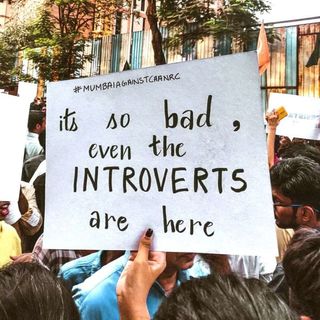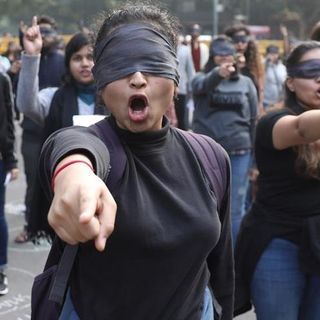
Why It’s Still Legal For Indian Men to Rape Their Wives
The government prioritizes keeping even violent marriages intact over holding men who rape their wives accountable.

It’s 2020 and India remains one of 36 countries where it is not a crime for a man to rape a woman — as long as they are married.
This asterisked exception features in Section 375 of the Indian Penal Code that defines rape as a criminal offense. A man commits rape if he has sexual intercourse with a woman against or without her consent, or if she is a minor. (The legal age of valid consent is 18 in India.) However, Exception 2 to Section 375 exempts unwilling sexual intercourse with a wife over fifteen years of age from this definition of rape, thus making it legal for men to rape women — who happen to be their wives — aged 15 and above.
Most countries in the world recognize that rape is rape, and that rape is a crime. So, what’s holding India, a burgeoning ‘superpower,’ back? A careful analysis points to several factors: an outdated IPC dating back to the Victorian era; a rigidly patriarchal society, across India’s myriad religions, that suppresses women’s voices and agency; and, a culture where marriage and family, in the dated sense of the words, still hold utmost significance as the building blocks of society.
But arguably, the most stubborn obstacle in the way of India criminalizing marital rape is none other than the Union Government itself. Despite the fact that at any given point, there are several writ petitions before the Supreme Court and the various high courts, filed by individuals and civil society organizations challenging the marital rape exemption to Section 375 — the government has continued to shield men who rape their wives by citing the same few reasons repeatedly. One critical glance is all it takes to break the reasons down to their barebones: misogyny and misconceptions.
Argument 1: It’s against Indian culture
In August 2019, former Chief Justice of India Dipak Misra said that marital rape should not be made a crime in India, The Times of India reported, “because it will create absolute anarchy in families and our country is sustaining itself because of the family platform which upholds family values,” Deccan Herald quoted Misra as saying.
Here, the basis of this argument is that marital rape cannot work in India as it works in the West due to stark cultural and socio-economic differences between the two regions. The argument is that social customs and religious beliefs, combined with staggering illiteracy create an environment wherein marital rape cannot be criminalized seemingly because people aren’t ready for it.
The Indian government has suggested that those seeking to stop women being raped by their husbands were “blindly” following Western customs, The Times of India reported: “This country has its own unique problems due to various factors like literacy, lack of financial empowerment of the majority of females, the mindset of the society, vast diversity, poverty, etc. and these should be considered carefully before criminalizing marital rape.”
Translation? The government is arguing that since a majority of people in India are illiterate, uneducated, poor, conservative and religious — unlike in America — they believe that a husband cannot rape his wife because a good Indian wife will dutifully consent to her husband forever. This, the government submits, is a unique obstacle India faces in criminalizing marital rape — by the admission of which it acknowledges that lakhs of men are violating their wives’ sexual consent on a daily basis based on this mindset and that what they’re doing is, in fact, the crime of rape. Then the government argues that if in such circumstances, they criminalize marital rape, a majority of marriages will fall apart presumably because women will stand up to their rapist husbands (who will then become criminals in the eyes of law) and avail of the legal recourse they have to seek justice and protection.
But if it is actually the fear of marriages falling apart that is stopping the government from criminalizing marital rape, then, in a way, it acknowledges that given the legal recourse and protection, women will want to end sexual violence they face day-after-day within their marriages. At which point it becomes important to ask: by placing so much value on marriages and family and pushing for status quo, whose rights is the government protecting? The husbands raping or the wives being raped?
None other than the Supreme Court agrees that criminalizing marital rape does not threaten marriages in any way. In Independent Though v. Union of India, the Court specifically explained that marriage is personal and nothing short of the Indian State criminalizing marriage itself can destroy the institution of marriage. It said if divorce and judicial separation have not destroyed the institution of marriage, criminalizing marital rape certainly can not either. Interestingly, the High Court of Gujarat also recently ruled that the non-consensual act of marital rape violates the trust and confidence within a marriage and that marital rape is what has damaged the institution of marriage.
If criminalizing the violent rape of two-third of married Indian women destabilizes the institute of marriage and family, then so be it.
Related on The Swaddle:
Marriage Is an Inherently Unfeminist Institution
Argument 2: Once married, women’s perpetual consent is implied
The idea that once a woman is married, she hands over never-ending, continuous sexual consent to her husband is a deeply embedded one in our society, as evidenced by a cringe-worthy and worrying vox populi ScoopWhoop conducted recently on the streets of Delhi about marital rape.
But the laws are supposed to be ahead and above’s people’s prejudices, the moderator of personal base emotions.
Instead, Indian laws still date back to the 1700s, when Matthew Hale of England had declared that “the husband cannot be guilty of rape committed by himself upon his lawful wife, for by their mutual matrimonial consent and contract the wife hath given herself up in this kind unto her husband which she cannot retract.” Another dated justification for not recognizing marital rape comes from William Blackstone in 1753 when he defended the common law doctrine of coverture (the legal status of a married woman as her husband’s property). Blackstone contended that “[B]y marriage, the husband and wife are one person in law: that is, the very being or legal existence of the woman is suspended during the marriage …”
Even as British law moved in in England Wales in 1991, when Lord Keith communicated on behalf of the Court that modern marriage is a “partnership of equals and the wife is no longer considered the subservient chattel of the husband,” Indian laws remain the same concerning marital rape.
This, despite a contradiction as incriminating as a 2017 Gujarat high court ruling which clearly says: “It has long been time to jettison the notion of ‘implied consent’ in marriage. The law must uphold the bodily autonomy of all women, irrespective of their marital status.”
Argument 3: Women will misuse any law against marital rape
In an affidavit submitted to the Delhi High Court, the union government said a law criminalizing marital rape can become an “easy tool to harass the husbands,” absurdly arguing “if all sexual acts between a husband and his own wife qualify to be marital rape then the judgment whether it is marital rape or not will singularly rest with the wife.” (As it should.)
This argument — that women will falsely accuse their husbands left, right and center — has been used time and time again for various domestic violence laws enacted to protect women in India including the Protection of Women from Domestic Violence Act, the Dowry Prohibition Act and Section 498A of the IPC, which criminalizes physical and mental cruelty against a woman by her husband or his family. There’s never any direct empirical evidence for the misuse claim except the low rate of convictions in dowry and cruelty cases, but what we do know is two out of every five women in India are victims of physical, sexual or emotional domestic violence. Choosing the number of convictions as the parameter to gauge the reality of the situation is also problematic because low conviction rates in India are often because of poor investigations, improperly collected or no evidence, and omissions of witness statements, and not because women are out to get men.
And even if some women misuse the law, that’s what the judiciary is there for — to weed out the false cases and dismiss them with an appropriate penalty! To quote the Gujarat High Court judgment again, Justice J.B. Padriwala says: “Let it be stressed that the safeguards in the criminal justice system are in place to spot and scrutinize fabricated or false marital complaints, and any person who institutes untrue and malicious charges, can be made answerable in accordance with the law.”
The misuse argument is also faulty in that it ignores how disadvantaged women are even to use the marital rape law if it exists, let alone misuse it. A lack of resources, access to legal help and stigma all provide resistance to women actually achieving justice under these laws, as can be seen from rape and domestic violence laws.
Interestingly, the cultural argument that criminalizing marital rape won’t work in India because women are illiterate, uneducated and poor directly contradicts the argument that criminalization of marital rape would lead to misuse. If women are not educated enough to properly use the law, it follows that they would be just as unable to misuse the law.
Related on The Swaddle:
Women Control Their Own Sexual Decisions, Judges Say
The only arguments that matter
The arguments upholding the legality of marital rape dated and violently oppressive, especially when contrasted with some of the more forward-thinking statements made by the judiciary independently. The facts, logic, and precedents are all there to compel the State to do good by half the population of India, but until the mindsets of those in charge change to give importance to a different set of established arguments, little will change.
Although under Article 14, the Indian Constitution guarantees equality, the marital law exception discriminates against females who have been raped by their own husbands by denying them equal protection from rape and sexual harassment.
The Exception to Section 375 creates two categories of women based on their marital status and prioritizes one unmarried woman in protecting them from rape than married ones — that’s a direct contradiction of every Indian citizen being guaranteed equal protection of laws. Exception 2 is also a violation of Article 21 of the Indian Constitution that states: “[n]o person shall be denied of his life and personal liberty except according to the procedure established by law.” Over recent years, as evolving contexts throw up new challenges to citizens’ fundamental rights, the Supreme Court has often interpreted Article 21 to extend beyond the literal guarantee to life and liberty and include the rights to health, privacy, dignity, safe living conditions, and safe environment and continuous internet among others.
In Suchita Srivastava v. Chandigarh Administration, for instance, the Supreme Court said the right to make choices about sexual activity is very much within the scope of rights to personal liberty, privacy, dignity, and bodily integrity under Article 21 of the Constitution.
The strongest argument in terms of legal precedents can be found in Justice K.S. Puttuswamy (Retd.) v. Union of India, in which the Supreme Court recognized the right to privacy as a fundamental right and specifically said that includes “decisional privacy reflected by an ability to make intimate decisions primarily consisting of one’s sexual or procreative nature and decisions in respect of intimate relations.” Forced sexual intercourse and cohabitation is a violation of that fundamental right. Since this ruling doesn’t differentiate between married and unmarried women and there is no explicit ruling (thankfully) that says women lose their fundamental right to privacy upon marriage — all women have the fundamental right to be able to consent and to be able to say no.
If Indian lawmakers need help figuring out what codifying marital rape as a crime in our laws should sound like, here’s a pro tip from a bench of Acting Chief Justice Gita Mittal and C Hari Shankar of the Delhi High Court. “Marriage does not mean that the woman is all time ready, willing and consenting [for sex]. The man will have to prove that she was a consenting party.” It really is that simple.
Pallavi Prasad is The Swaddle's Features Editor. When she isn't fighting for gender justice and being righteous, you can find her dabbling in street and sports photography, reading philosophy, drowning in green tea, and procrastinating on doing the dishes.
Related


All the Arguments You Need: To Prove It’s Fair for Trans, Intersex Athletes to Compete in Consistence With Their Gender Identity
